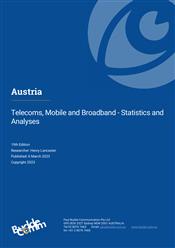Austria Telecoms Market Report
Telecoms, Mobile and Broadband - Statistics and Analyses

Austria’s telcos expand fibre broadband reach
Austria has a mature telecom market, dominated by Telekom Austria, Magenta Telekom (formed from the merger of T-Mobile Austria and the cableco UPC Austria), and 3 Austria. The mobile market benefits from a growing number of MVNOs. The three multi-service operators are among the numerous telcos which in recent years have signed various network access agreements aimed at quickening the pace of fibre-based infrastructure rollouts. As one result of this process, the telecom regulator has removed market regulations relating to Telekom Austria’s wholesale broadband services.
In common with other countries in the region, the telcos as well as the government and regulator have focussed on delivering improved telecom infrastructure. The government has in train a program to provide a national gigabit service by 2030, delivered by private enterprise though with some state funding. This is based on fibre networks supported by 5G, with the MNOs able to expand the reach of their 5G services following auctions held in March 2019 and September 2020. More recently, a plan has also been developed through to 2026 which would release additional spectrum in several bands to help increase network the capacity, and so improve the quality of services offered.
The fixed-line broadband market is still dominated by the DSL sector, though it is slowly losing market share as improved cable broadband has taken a greater proportion of new subscribers. The fibre sector was slow to develop, and although fibre penetration remains low there is considerable vigour among operators to build out networks. Magenta Telekom has announced plans to invest €2 billion in its fixed and mobile network by 2030, in conjunction with partners. The work will see a gigabit fibre service delivered to more than 2.5 million premises, or about 60% of the total.
This report presents key aspects of the Austrian telecom and ICT markets, including statistical data on the country, the fixed network services sector and telecom infrastructure. It also presents an overview of recent regulatory developments affecting broadband access and mobile spectrum.
Key developments:
- Magenta Telekom planning to phase out its 3G network from the beginning of 2024 and refarm spectrum for LTE and 5G services.
- A1 Telekom achieves download speeds of 2Gb/s using three-band CA technology.
- Deutsche Telekom completes the sale of a 51% stake in its Austrian mobile tower business to GD Towers.
- A1 expecting to provide national coverage with its 5G service by end-2023.
- Magenta Telekom extends its 1Gb/s services, partners with Meridiam to build out FttP to 650,000 new premises by 2030.
- Regulator completes multi-spectrum auction for 5G services.
- Government provides an additional €1.4 billion for its national broadband program.
- Report update includes the regulator's market data to Q2 2022, telcos' financial and operating data to Q4 2022, updated Telecom Maturity Index charts and analyses, recent market developments.
Companies mentioned in this report:
Telekom Austria (A1), Tele2, tele.ring, Magenta Telekom (UPC Austria, T-Mobile Austria), 3 Austria, Orange Austria, Mundio, Lycamobile, Yesss!, M:Tel Austria, Hofer Telekom, Xlink
Related Reports
- Europe - Mobile Network Operators and MVNOs
- Germany - Telecoms, Mobile and Broadband - Statistics and Analyses
- Moldova - Telecoms, Mobile and Broadband - Statistics and Analyses
- Iceland - Telecoms, Mobile and Broadband - Statistics and Analyses
- Italy - Telecoms, Mobile and Broadband - Statistics and Analyses
- Malta - Telecoms, Mobile and Broadband - Statistics and Analyses
- Spain - Telecoms, Mobile and Broadband - Statistics and Analyses
- Denmark - Telecoms, Mobile and Broadband - Statistics and Analyses
- Russia - Telecoms, Mobile and Broadband - Statistics and Analyses
Share this Report
TMT Intelligence
A platform to scale your intelligence tasks
Monitor critical insights with our AI-powered Market Intelligence Platform gathering and analyzing intelligence in real time. With AI trained to spot emerging trends and detect new strategic opportunities, our clients use TMT Intelligence to accelerate their growth.
If you want to know more about it, please see:
Research Methodology
BuddeComm's strategic business reports contain a combination of both primary and secondary research statistics, analyses written by our senior analysts supported by a network of experts, industry contacts and researchers from around the world as well as our own scenario forecasts.
For more details, please see:
More than 4,000 customers from 140 countries utilise BuddeComm Research
Are you interested in BuddeComm's Custom Research Service?
Hot Topics
News & Views
Have the latest telecommunications industry news delivered to your inbox by subscribing to BuddeComm's weekly newsletter.